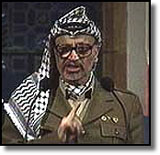
|
Arafat Thanks Blair for Middle East ConcernPalestinian leader Yasser Arafat has thanked Britain for its efforts to revive the Middle East peace process, which he warned had reached an "impasse".Mr Arafat was speaking after meeting with Tony Blair in London on Monday afternoon. He described their discussion as "positive and very important", paying tribute to the Prime Minister for "what he is doing with all his capability to protect the peace process". The Palestinians are keen for the EU to play a more active role in the Middle East. Mr Blair has indicated that when Britain takes over the EU Presidency in January, the region will be a central foreign policy priority. The peace process has been stalled since April, following Israel's decision to build a new Jewish settlement on Har Homa - known to the Palestinians as Jebel Abu Ghneim - in east Jerusalem. In a statement, the Prime Minister declared that "the continued building of Israeli settlements is not only illegal under international law, but a major obstacle in the way of peace." Making clear Britain's determination to move the peace process forward, Mr Blair underlined his support for the efforts of Egyptian President Hosni Mubarak to restart the negotiations between Israel and the Palestinian Authority. A lasting peace, he said, had to be "based on the two key principles of land for peace and the right of Israel to live in peace within secure and recognised boundaries." Mr Blair assured Mr Arafat that Britain would continue to provide the Palestinians with aid, currently amounting to £25 million each year. And he urged the veteran PLO leader to do his utmost to contain violence and respect human rights. Over the last year, violations of human rights in the Palestinian-ruled territories have met with sharp international condemnation. As the two leaders met, Israeli troops and Palestinian security men joined forces to restore calm to the volatile West Bank city of Hebron. The Palestinians prevented local youths from stoning the soldiers while the Israelis allowed Arab shops to open. The move came one day after serious clashes in Hebron. Sixteen Palestinians were wounded, including five journalists working for foreign media companies. In Jerusalem, Israeli Prime Minister Binyamin Netanyahu told reporters that if the Palestinian Authority wished to "renew the diplomatic process, it will find in us a partner." He added, however, that "if this violence continues, it will require us to take very firm steps including measures that I don't want to elaborate on now." |
Diana, Princess of Wales, 1961-1997
Conference 97
Devolution
The Archive
News |
Issues |
Background |
Parties |
Analysis |
TV/Radio/Web
Interactive |
Forum |
Live |
About This Site
News |
Issues |
Background |
Parties |
Analysis |
TV/Radio/Web
Interactive |
Forum |
Live |
About This Site
© BBC 1997 |
politics97@bbc.co.uk |
